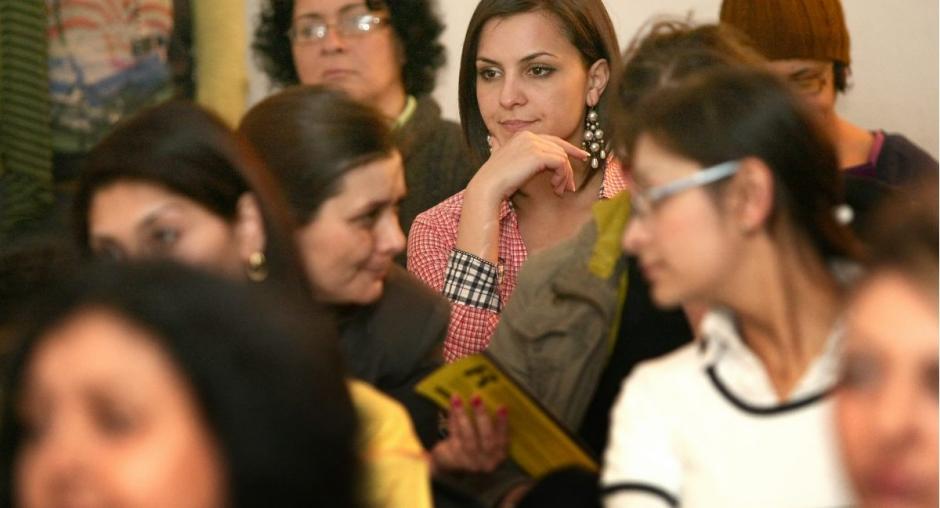Roma women in the shadow of their identity
For Roma in Bosnia and Herzegovina (BiH), life can be a challenge on many levels. Roma are the largest national minority group in the country and at the same time the most socially, economically and politically marginalized. They face discrimination every day.
For Roma women, the problems are compounded. They have to deal with extreme poverty, domestic violence, early marriages, forced begging and poor access to education.
However, there are Roma women who succeed and become leaders for positive change in their communities.
Living with prejudice
“My childhood was very difficult. I lost both parents by the age of 15,” says Melina Halilovic, President of the Association of Youth Roma Initiative “Be my Friend” and member of the Municipal Council in Visoko. “I have a younger sister and I had to take care of both of us. All of that made me start working when I was 15. We had to survive.”
Melina often encountered discrimination, especially in primary school. But rather than give in, she started fighting for her rights.
She joined the Association of Youth Roma Initiative “Be my Friend”, and later a Roma women’s network “Success”, through which she gained the education and skills she needed to engage in politics. In October 2016, Melina was elected to the Municipal Council of Visoko, in central Bosnia and Herzegovina.
“I am very proud to be in a position to help other Roma, especially Roma women and girls, because they are discriminated against on two grounds: for being women and for being Roma,” says Melina. “They always have two battles to fight and win: one in their families and a second one in society, to prove that they can be successful.”
Melina believes that Roma women have to fight for themselves and search for opportunities that will help them to achieve their goals.
Every year from 8 March to 8 April, the Roma women’s network “Success”, a group of seven Roma organizations dedicated to improving the legal, social and economic status of Roma women and children, marks the Month of Roma Women’s Activism. This year, the OSCE Mission to BiH supported roundtable discussions between Roma women and representatives of municipalities, social work centres, schools and other relevant institutions. Development of local action plans for inclusion of Roma in all spheres of society was in focus of these roundtables.
Voices that matter
Roma women can be leaders of social change, but they have to be given the opportunity. For a start, they need the support of their families, says Sanela Basic, Executive Director of the Roma information centre Kali Sara. “I consider myself a very lucky person as I always had the support of my family. For my parents, my education and that of my sisters was a top priority. So I had one less battle to fight.”
Similar to Melina, Sanela had to fight prejudice in primary school, but as time passed she started to break down the preconceptions of her classmates. She became the only student in her class at the Law Faculty in Sarajevo to be awarded two scholarships simultaneously. “It was not easy, but I succeeded,” she says. “I was also engaged in many extra-curricular activities and went to Budapest for an internship”.
“It cannot be true that you are Roma, you are not like them,” – Sanela would often hear in Sarajevo.
“People imagine Roma women as having dark complexions and dirty clothes, as being uneducated and often begging in the streets, but these are all stereotypes,” says Sanela. “Roma women can be successful. But family support is a must, as is the understanding of society.”
The OSCE Mission helps Roma communities obtain better access to the authorities and human rights institutions, increase their political participation, and strengthen their role in society. The aim is to ensure the full and effective participation of Roma in governmental bodies and structures, address problems in the areas of housing, health, employment and education, as well as combat discrimination and prejudice against Roma.
Be the change you want to see
“Today, when people meet me, they know I have something important to say. They respect my suggestions and ideas, but that was not always the case. At the end of the day, being a Roma is only a part of my identity, and not the only one. I have much more to offer to society,” says Sanela.
Roma girls and women experience prejudice every day. Through education and active participation in civil society, they can overcome stereotypes and become equal members of society.
“Education is the key for Roma girls and women,” says Aldijana Musli of the Human Rights Section at the OSCE Mission to BiH. “At the same time, it is up to society to reject stereotypes and prejudice, and to create equal opportunities that allow Roma women and girls to achieve their full potential.”


